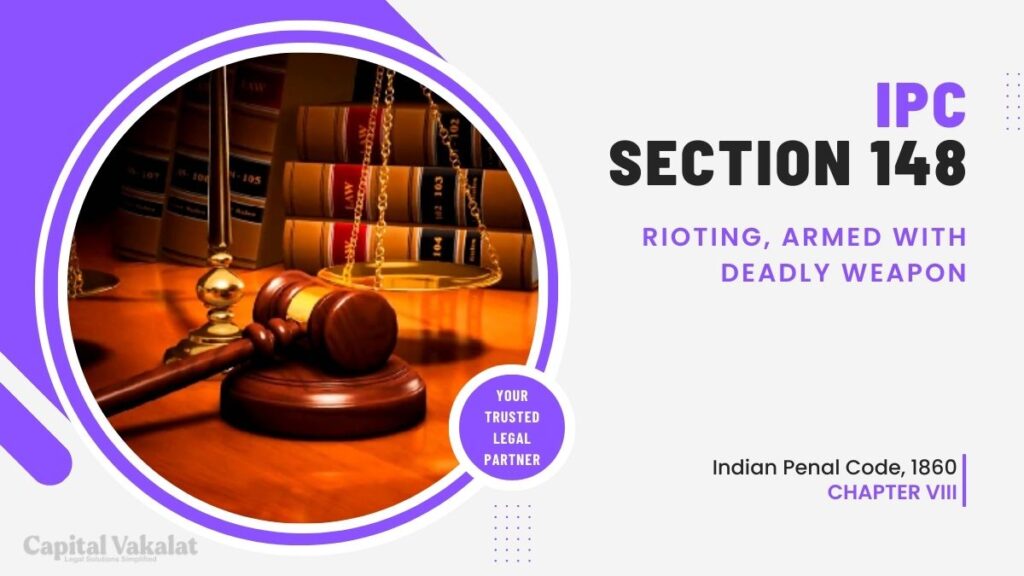The Indian Penal Code (IPC) is a comprehensive legal framework that defines various criminal offenses and their penalties. Among these, Section 148 deals with rioting while being armed with deadly weapons.

This article explores the specifics of Section 148 IPC and its implications.
Understanding Section 148 of the IPC
Section 148 of the Indian Penal Code is a significant legal provision that addresses the issue of rioting. It stipulates that if an individual is found participating in a riot while carrying a deadly weapon, they could face severe legal consequences.
Rioting: A Serious Offense
Rioting is a criminal offense that threatens public order and peace. It typically involves a group of individuals engaging in violent and unlawful activities, such as damaging property, causing harm to others, or disrupting the normal functioning of society.
Elements of Rioting
To establish a case of rioting under Section 148 IPC, certain elements need to be satisfied:
- Presence of five or more individuals.
- A common object shared by the individuals.
- The use of force or violence.
Armed with Deadly Weapons
The addition of being armed with a deadly weapon escalates the gravity of the offense. Deadly weapons include firearms, sharp-edged weapons, or any object that can potentially cause severe harm.
The Significance of Intent
In criminal law, intent plays a crucial role. To be convicted under Section 148 IPC, the prosecution must prove that the accused individuals had the intent to use the deadly weapon to facilitate the riot.
Provisions of Section 148 IPC
Section 148 IPC provides a legal framework for dealing with rioting while armed with deadly weapons. It is an essential tool for law enforcement to maintain law and order during such disturbances.
Punishment for Rioting
If found guilty under Section 148 IPC, the punishment can be severe. The sentence can extend to a maximum of three years in prison, along with a possible fine.
Role of the Police and Evidence
Law enforcement agencies play a crucial role in investigating and gathering evidence in cases related to Section 148 IPC. They must establish a strong case with substantial evidence to secure a conviction.
Notable Cases
Over the years, several high-profile cases have brought Section 148 IPC into the spotlight. These cases serve as examples of the legal implications and the seriousness of the offense.
How to Defend Against Section 148 IPC
Defending against Section 148 IPC charges can be complex. It requires a robust legal strategy, thorough investigation, and the expertise of an experienced criminal defense attorney.
Importance of Legal Representation
Legal representation is essential when facing charges under Section 148 IPC. A skilled attorney can navigate the complexities of the legal system and ensure a fair defense.
The Legal Process
The legal process involving Section 148 IPC cases can be lengthy. It includes investigations, trials, and appeals. Understanding this process is vital for all parties involved.
Conclusion
Section 148 IPC addresses a critical issue related to rioting while being armed with deadly weapons. It underscores the seriousness of such offenses and the need for legal consequences. Legal representation and understanding the legal process are crucial for both the accused and the prosecution.
Frequently Asked Questions
What are the elements of rioting under Section 148 IPC?
The elements include the presence of five or more individuals, a common object, and the use of force or violence.
What are considered deadly weapons in this context?
Deadly weapons include firearms, sharp-edged weapons, or any object that can potentially cause severe harm.
What is the maximum punishment for Section 148 IPC offenses?
The maximum punishment can extend to three years in prison, along with a possible fine.
How can one defend against Section 148 IPC charges?
Defending against such charges requires legal representation and a strong legal strategy.